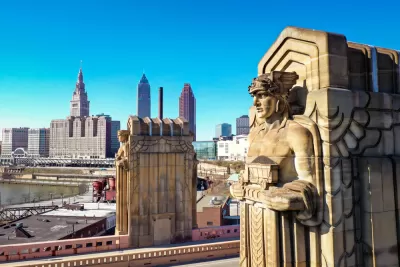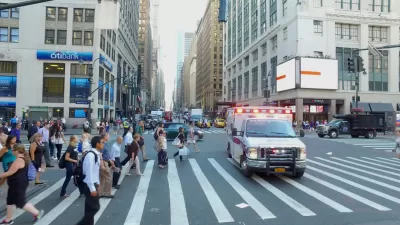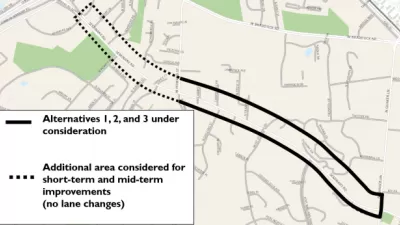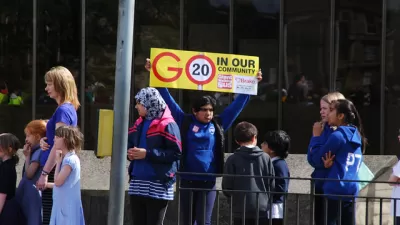Cleveland is working to become the latest U.S. city to set a goal to eliminate traffic fatalities.

Cleveland is putting the finishing touches on a Vision Zero plan following four years of planning, according to an article by Steven Litt for the Plain Dealer. The plan would eliminate traffic fatalities in the city by 2032.
After providing an overview of the international Vision Zero movement, Litt describes the need for traffic safety improvements in Cleveland. “Some 19,000 crashes have occurred on city streets over the past five years,” writes Litt. “The average annual number of deaths from 2016 to 2021 was nearly 55. There were 74 deaths in 2021, and 31 as of August 8 this year” according to Litt’s source in the article, Calley Mersmann, Cleveland’s senior strategist for transit and mobility.
Traffic safety is also much worse in Cleveland’s predominantly Black neighborhoods on the city’s East Side, according to the article.
While traffic fatalities are climbing nationwide, and some cities that have made great fanfare of their adoption of Vision Zero have only seen more traffic fatalities in recent years, there are few notable examples of success, including Fremont, California and Hoboken, New Jersey.
Advocates, such as Angie Schmitt writing for Planetizen in March 2021, say Vision Zero is possible, with the right combination of technological and design changes, notably including speed governors on cars such as the technology required of electric scooters.
The source article, linked below, includes more details about the political and planning partnerships that paved the way for Cleveland’s new Vision Zero initiative. Vision Zero will be considered by the city’s Planning Commission later this week, before heading to the full City Council for final approval.
“The city is also ramping up its Complete and Green Streets program, following City Council approval earlier this year of an updated version of an earlier ordinance carrying the same name,” notes Litt.

Alabama: Trump Terminates Settlements for Black Communities Harmed By Raw Sewage
Trump deemed the landmark civil rights agreement “illegal DEI and environmental justice policy.”

Planetizen Federal Action Tracker
A weekly monitor of how Trump’s orders and actions are impacting planners and planning in America.

The 120 Year Old Tiny Home Villages That Sheltered San Francisco’s Earthquake Refugees
More than a century ago, San Francisco mobilized to house thousands of residents displaced by the 1906 earthquake. Could their strategy offer a model for the present?

In Both Crashes and Crime, Public Transportation is Far Safer than Driving
Contrary to popular assumptions, public transportation has far lower crash and crime rates than automobile travel. For safer communities, improve and encourage transit travel.

Report: Zoning Reforms Should Complement Nashville’s Ambitious Transit Plan
Without reform, restrictive zoning codes will limit the impact of the city’s planned transit expansion and could exclude some of the residents who depend on transit the most.

Judge Orders Release of Frozen IRA, IIJA Funding
The decision is a victory for environmental groups who charged that freezing funds for critical infrastructure and disaster response programs caused “real and irreparable harm” to communities.
Urban Design for Planners 1: Software Tools
This six-course series explores essential urban design concepts using open source software and equips planners with the tools they need to participate fully in the urban design process.
Planning for Universal Design
Learn the tools for implementing Universal Design in planning regulations.
Clanton & Associates, Inc.
Jessamine County Fiscal Court
Institute for Housing and Urban Development Studies (IHS)
City of Grandview
Harvard GSD Executive Education
Toledo-Lucas County Plan Commissions
Salt Lake City
NYU Wagner Graduate School of Public Service





























